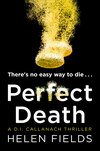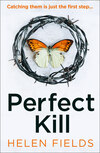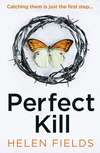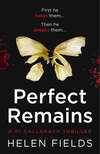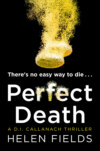Kitabı oku: «A DI Callanach Thriller», sayfa 4
Chapter Nine
The lack of progress was driving Callanach crazy. He’d attended Elaine Buxton’s memorial service and watched the vast crowd outside weeping for a woman most of them didn’t know personally but who’d been stolen from their city. He knew what the collective was thinking. That it could have been them. That it could have been their wife, sister, daughter or mother. Such crimes left scars on the landscape of a community as vivid as the scorched earth that was once a mountain bothy. The crowd had come not only to mourn, but to jointly experience that unspoken truth. Thank God it was not me. And there was nothing wrong with that, Callanach thought, the clinging on to life. That was what policing was about, after all. Protecting, valuing, cushioning a too short, too fragile existence.
In the fortnight since then, the hours had started to drag. His phone rang less and less often. Public appeals for information had proved fruitless. The police had trawled Elaine’s computer files, diary, emails, current and past cases. Nothing had raised a red flag. She’d avoided social media, tended to call friends rather than texting, had never gone near an internet dating site. The usual lines of enquiry were dead-ending. Callanach had even found the time not only to tip the contents of his boxes into drawers, but to organise them into some semblance of order.
‘Is it a bad time?’ Ava Turner asked, putting her head round his office door.
‘I’m not exactly busy, if that’s what you’re worried about,’ he replied. He’d seen her a handful of times in the last couple of weeks, but never in circumstances when he could apologise for his behaviour. Now too much time had passed and he felt ridiculous referring back to her offer of a drink and his negative reaction.
‘I need a couple of spare bodies to chase up a development on a case. Can I borrow some help from your team for the week?’ She parked herself in a chair opposite him.
‘Absolutely,’ Callanach replied. ‘It would be good for them to get working on something else.’
‘No breakthroughs?’ she asked. ‘That’s tough.’
‘It’s wrong,’ Callanach muttered. ‘For a murderer to be so meticulous in their planning, to have thought so far ahead. It’s completely at odds with the chaos or fanaticism it takes to kill.’
Ava sat forward, transforming from colleague to detective as she considered it. ‘That’s because you’re looking for a well-organised murderer. You’ve stopped thinking about him or her as a person. Whoever did this couldn’t employ those sorts of skills from thin air. You’re looking for someone who’s meticulous in their whole life, probably obsessively so, who’s never missed an appointment or favourite radio show, who reviews their time expenditure each month on different activities, who diarises when they last changed their sheets. Look for the person first. You’ll meet the killer later.’ Ava got up. ‘So I can take two from your team?’
‘As long as one of them is DS Lively,’ he said.
‘Not a bloody chance,’ she answered.
‘Do you have an hour or so available for a drink this evening?’ Callanach asked as she headed out of his office. Ava stepped back inside to answer.
‘I don’t think so,’ she said.
‘If it’s about last time …’ He shrugged his shoulders. ‘It’s been a difficult transition moving here.’
‘The station is awash with rumours about your move from Interpol. There’s always gossip when an outsider takes rank instead of promoting internally. I understand you want to settle into the job before starting to socialise and that’s perfectly sensible,’ Ava said.
‘Actually that’s not …’
DC Barnes walked in, which Ava took as either a cue or an excuse to leave, Callanach wasn’t sure which. Barnes’ face was alight with a mixture of concern and adrenaline. ‘We think we’ve got another one, sir. A woman’s been missing since last night. Her assistant called it in.’
‘What’s the link with Elaine Buxton?’ Callanach asked.
‘The woman left work as usual but there’s no sign of her entering her home. Similar age to Elaine, single, no children. Totally out of character for her to go off the grid. Missing person report’s available in the briefing room and we’re bringing in the assistant for more information. We’ve got units at the woman’s home and are making the usual enquiries with colleagues.’
The briefing room was buzzing. Callanach took a seat at the back as he prepared to listen to what information had been gathered, notebook ready on his lap. Ava Turner opened the door and looked in quizzically. He beckoned her in.
‘I was coming to collect my extra bodies,’ she whispered. ‘What’s going on?’
‘Another woman is missing,’ he said.
‘Mind if I stay and listen?’ she asked. He shook his head and she took the seat next to his.
Jayne Magee’s face appeared on the screen. There was a slightly suppressed intake of breath from everyone watching. Callanach didn’t know why it was so shocking, only that the surprise came from what was around her neck in the photo. The sergeant who’d taken the missing person report began to speak.
‘This is the Reverend Jayne Magee, thirty-six years of age, Caucasian, Scottish national. Her administrative assistant, Ann Burt, called in her disappearance when Jayne failed to arrive for a meeting this morning at the Cathedral Church of St Mary in Palmerston Place, part of the Scottish Episcopal Church. What rang alarm bells is that she appears not to have been home last night. Her assistant says Jayne had no plans. The Reverend had told Ann she was looking forward to a quiet night in with a curry. Her only vice, apparently. When she failed to attend the meeting this morning and couldn’t be reached by phone, the assistant went to her house. She has a key and let herself in. There was no sign of Jayne. No bag or coat and in the fridge the curry they’d talked about was sitting untouched. Ann had emailed her at seven yesterday evening, passing on a query and got no response. Usually, the last thing the Reverend does every night is to check emails and respond to them. Ann Burt said she was curious about it last night but assumed something had come up, either illness or an unexpected visitor, and didn’t pursue it with a phone call.’
‘Where’s her home?’ Lively shouted from the far side of the room.
The sergeant shifted images and the screen flashed up a map of the city. The cathedral was marked with a blue cross and a red dot denoted what Callanach presumed was the home.
‘She lives in a detached house in Ravelston Park, across the river from the cathedral and roughly north-west. She always walks to and from work, even in the worst weather, and we’re told she was on foot yesterday.’
‘So, she left St Mary’s at?’ Callanach asked.
‘Around seven p.m. She’d been there for choral evensong, stayed to chat with a few people then gone home. There’s no sign of a break-in or a struggle, nothing missing that the assistant can identify.’
‘I see the similarities,’ Callanach said, ‘but do you not have anything more tangible that connects this to Elaine Buxton?’
‘Only this.’ A new photo filled the screen. As one, the people in the room leaned forward to make out what they were looking at amidst the green tangle in the picture. ‘Here, at the very bottom, is where Jayne Magee’s mobile phone was found. Just inside her front garden, at the roots of a bush. Whether she dropped it or someone else discarded it, we don’t know. It’s been sent off for prints and data.’
‘She could have been trying to make a call, perhaps worried that she was being followed, was disturbed and dropped it,’ Salter suggested.
‘Or whoever took Magee didn’t want us tracing the signal and getting a location,’ Ava muttered. ‘I’ll manage without your lot,’ she whispered to Callanach. ‘Looks like you’ve got work to do now.’ She left.
That wasn’t much to go on as far as linking the cases went. If it was the same person who’d taken Elaine, the one thing they knew was that Jayne Magee might not have much time left. Callanach rose to his feet, running a hand through his mop of hair as he walked to the front. It took all of two seconds for the noise level to reach a point where he couldn’t be heard.
‘Arrêtez,’ he snapped, reverting to French in his frustration. ‘Stop. There is no time.’
Someone tried a derisive oohing at Callanach’s loss of temper, only to be met by DS Lively cutting in.
‘We’ve work to do and the inspector’s trying to organise things. So if whoever that was can’t get a grip, then get out of the goddamn room,’ Lively yelled.
Callanach stared at him a moment, then opened his notebook to go through the list he’d compiled during the briefing, wondering if Lively had suffered some sort of character changing concussion. No doubt it wouldn’t last long.
‘CCTV footage, see if we can catch any part of her journey home. Neighbours, anyone who might have seen her near her home last night. Presumably the forensics team is already there?’ There was a nod from the officer who’d given the briefing. ‘Find the last person she talked to before she left the church. Ask what sort of mood she was in, what they discussed, what she was wearing. I want diaries, computer, make the mobile a priority. Tripp, you and Salter find anything that might connect her with Elaine Buxton. I want a full background on them both, from childhood to date. Understand?’ There were nods all round. The piss-taking was conspicuous in its absence, which showed Callanach that everyone thought what he was thinking. The clock was ticking. ‘Good. Now get back to work.’ The team filed out swiftly, buzzing with the combination of adrenaline and pressure. The next twenty-four hours would be crucial.
Lively managed to be in Callanach’s office before him. ‘I’d like to interview the witnesses at the church,’ he said. He was red faced and breathing hard, all evidence of his former cocky bloodymindedness evaporated.
‘Any particular reason?’ Callanach asked.
Lively nodded and stared at the floor. ‘It’s that, er, it’s where I go. To church, I mean. I know the Reverend Magee. Not personally, we’ve not spoken or anything, but I’ve seen her at services. She’s a good person and if this is the same man who abducted Elaine Buxton then I’d like to be able to handle the people at the church myself. Sir.’ He didn’t look at Callanach while he waited for a response. The humiliating addition of the respectful form of address was all Callanach needed to comprehend just how strongly Lively felt.
He wanted to say no, to punish his detective sergeant for the earlier thinly veiled threats and nastiness. But at least by having Lively centred on the church, the man would be out of his way. And there was the fact that Callanach had gone too far in shoving him, not that a man with Lively’s ego was going to make a complaint, but it was better to have a rival beholden than aggravated. Reason triumphed over anger.
‘It makes sense, as long as this isn’t too personal. I need you to be focused,’ Callanach decided.
‘I’ll be fine. I’d appreciate it if we could keep this between ourselves,’ Lively muttered.
It was beyond irony, Callanach thought, for Lively to have threatened to reveal whatever muck he’d heard about the forced departure from Interpol, only to ask for his own private life to be respected.
‘Take a constable with you and get started straight away. We’re already too many hours behind this bastard,’ was all Callanach said.
Jayne Magee was about as unlikely a target as anyone could imagine. There was no suggestion that Elaine Buxton was a regular at any church at all, so religion wasn’t the link. The pathologist hadn’t been able to estimate Elaine’s time of death, meaning they had no established pattern to follow, only the knowledge that she’d been missing sixteen days before her body was found. This time, the abductor might keep Jayne alive for weeks or she could be dead already. The killer had become a male in Callanach’s mind. There was no evidence, nothing solid, only years of past cases and what was screamingly obvious. Maybe it was more than one person, he considered, but Ava was right about looking at personality first. He couldn’t see such an obsessive character working well as a team player.
Callanach met with Jayne Magee’s assistant, Ann Burt, that afternoon. She dropped a dripping umbrella into Callanach’s bin then removed and folded her headscarf before sitting down. Callanach instinctively tidied his desk as she settled in. Stick thin, shrill and at the far end of her sixties, he guessed, Ann Burt told it like it was. She reminded him of his grandmother, distant though those memories were.
‘So I’m talking to the detective inspector, am I?’ she began. ‘You’re the third person I’ve repeated myself to today. Would you like to tell me what’s going on?’
‘It’s just routine, Mrs Burt. We’re covering all the angles.’
‘I may be old but I’ve not lost my faculties. I’ve had a call to say that there are three police officers at St Mary’s and a whole team at Jayne’s house. You’re thinking the worst, no doubt.’
‘There’s no trace of her at present and no one has contacted us to say they know where she is, so it’s all just standard investigative procedure.’
‘And the name Elaine Buxton hasn’t come up, is that right?’ Callanach didn’t say a word. The standard procedure line was one thing. Lying was another. ‘I thought as much,’ she went on. ‘You should know that the Reverend Magee has the heart of a lion. She’s a match for anyone. Don’t you go writing her off just yet.’ The words were brave but her eyes were too bright. Callanach made a few unnecessary notes while she regained her composure.
‘We don’t know who did this but experience tells us that in every case, a quick start is essential. We’re hoping the Reverend will turn up, that it was some personal crisis, perhaps simply that she needed time alone. But if that’s not the case then we have to consider all the possibilities,’ he said.
‘She led a prayer vigil for Miss Buxton shortly after she went missing. Hundreds came, we lit candles, prayed, had a minute of silence. Of course, we had no idea then what had happened to the poor girl.’ This time when the tears started Callanach didn’t pretend he hadn’t seen them.
‘We’re going to do everything we can. You’ve brought us her diary and computer, which will help. Tell me more about the sort of person she is,’ Callanach prompted.
‘She’s lovely, genuinely lovely. Not showy or loud, just warm. She has a wicked sense of humour, too. I never expected that from a lady in her position. Just goes to show, you shouldn’t judge. She’s very approachable, always has time for people. But bright, my goodness. Jayne studied at Oxford University, a master’s degree. Always has her nose in a book.’
‘And Jayne never said that anything was worrying her? Someone paying her too much attention, maybe?’
‘Never,’ Ann replied. ‘If that girl ever had an unkind thought about anyone, she didn’t express it in my presence.’ She picked up her handbag. ‘You’ll find her, won’t you, Inspector? Before anything …’ She couldn’t finish the sentence.
‘I’ll do everything in my power to find her,’ he said. Ann Burt patted his hand, a contact he tolerated for a second before pulling away and standing up to see her out.
By the end of the afternoon they were no further forward. The lab had confirmed that the only fingerprints on the phone belonged to Jayne Magee. Interviews of the immediate neighbours were tributes to the kind-hearted woman living next door and reports of how shocked they were that she was missing. Callanach gave in. He took Jayne Magee’s file and went home, collecting a take-out curry on the way. If that was the missing reverend’s only vice, then it was a good choice.
Back in Albany Street he ate dinner watching television. The evening news brought Ava Turner’s face before him, appealing for witnesses about a newborn baby who’d been left on a park bench and died tragically from exposure before he could be found. Ava looked like he felt. Callanach hadn’t been aware of the case she was investigating, but any incident involving a child was hard to handle.
Without thinking about it, he dialled her number. When the voicemail message clicked in, he considered hanging up then gave himself a mental kick. It was time to find allies.
‘Ava, it’s Callanach. I appreciate you’re tired and busy, but I could do with a second opinion on the case and I’m afraid you’re top of the list. Actually, yours is the only name on the list. So let me apologise and start again, tomorrow night perhaps, if we’re both free? Let me know.’
Too caffeine-buzzed to sleep, he opened Jayne Magee’s daily diary. It was shaping up to be a long night.
Chapter Ten
The head of the Department of Philosophy had called King in to her office not five minutes after he’d returned to work. She might at least have let him clear his backlog. After three weeks away, the accumulation was frustrating. Could no one have covered his duties while he was away? He may not really have been sick, but his colleagues didn’t know that, did they? Not one call to offer sympathy or concern. And this morning the other administrative staff hadn’t even asked him about it. This was the way it had always been, no reason to expect anything better at this point. Was it intimidation or jealousy, he wondered, as he deliberately delayed by making tea, keeping Natasha, or Professor Forge as she insisted he call her, waiting just a few minutes more.
By the time King opened her door, she was taking a telephone call and raised her forefinger as if he was a wayward student, keeping him still and silent while she finished her business. Natasha was wearing a dark green suit that emphasised her hazel eyes and ash blonde hair. King hated the way she made him feel. Even though he couldn’t bear to be in her company these days, there was no escaping her beauty. He admired her long, slender neck, with skin that would have flattered a woman in her early twenties. Forge’s thirty-sixth birthday had come and gone yet she was remarkably untouched by the signs of ageing. But King wouldn’t let her affect him like she used to – he had a new world waiting at home that she could never conceive. Like some great Vernean adventure, he would travel into his secret inner domain, moulding it until his utopia was complete. He pictured Natasha there – she could insist he call her Professor to her face, but in his head he called her other names, some she wouldn’t like at all – and felt a desire so strong wash over him that the mug in his hand began to shake. Finally she hung up.
‘Sit down, please, Dr King. It’s good that you’re back at work. I’d like you to arrange a speaker for the next evening lecture. It’s only two weeks away so we’re behind with the arrangements. Can you organise it in that time frame?’ She raised her eyebrows at him. There had been a time when he’d loved that expression, her pensiveness. He’d been wrong. It was irritating. He hadn’t noticed then how it created tiny frown wrinkles across her brow, or her patronising habit of tipping her head to the side as she waited for a response.
‘Easily,’ was his reply.
She breathed in as if about to say something more, changed her mind and flipped her diary shut.
‘All right. The speaker should address one of our listed titles for the term and we’ll need an outline of their lecture seven days beforehand, so time’s tight.’
‘I know the format,’ he said, enjoying her tension. She had her arms crossed defensively over her chest. Little did she know how appropriate it was, he thought. If she could only see what he’d done; all that he’d become. The tailored suits and high heels, her immaculate hair kept short and businesslike, wouldn’t be so intimidating on his home territory.
‘Right, you’ll have a lot to catch up on from your leave, so that’ll be all.’ She turned her face to the computer monitor. He had been dismissed. All she’d ever done was dismiss him. King had once put forward a paper he’d spent months researching and writing, offering it for inclusion in the department’s journal, only to have it rejected out of hand. Three times he’d applied for academic posts in the department. Twice he’d been discounted at the first stage. The third time, he’d been selected for interview. He remembered his elation upon receiving the notification letter with something close to shame. He’d worked hour after hour, consuming every volume on philosophy he could find, studying teaching plans, the history of the department, everything and anything that would impress the board. He was finally going to receive the recognition he was owed. He wouldn’t let himself down.
On the day of his interview, he’d been calming his nerves in the gents’ toilets, splashing cold water on his face. That was when he’d heard those imbeciles giggling together, thinking they couldn’t be overheard in the ladies’ next door.
‘What are they doing interviewing him? He gives me the creeps and he’s horrible to the students, won’t give them the time of day. Can you imagine him teaching? I’m not staying here if he’s on the faculty, doing his typing, organising his diary. He’ll probably make us all address him as sir,’ the ugly bleached-blonde receptionist had said. He’d always loathed her. She embodied the worst of young women, concerned only with their grooming and social lives, handing themselves out to the lowest bidder, couldn’t write a sentence without a spelling mistake.
‘He’ll probably make us curtsy when we go in his room,’ said another. This was an older voice. Deirdre, King thought. That was worse. She’d always been polite to his face, friendly, even. How quickly women betrayed. Throwing a paper towel in the bin he told himself to stop listening, knowing it was stupid, damaging his confidence before the most important thirty minutes of his life and a chance at the academic career he’d always desired. But he’d stayed. It was the human condition: the need to know the worst, the destructive desire to see how it feels when you hit rock bottom. He’d inched closer to the wall to hear better. The voices were hushed and he’d held his breath to catch the words.
‘I shouldn’t worry about it,’ two-faced Deirdre had hissed. ‘Natasha didn’t even want to interview him but Human Resources told her she should. They didn’t want a challenge to the fairness of their long-listing process. His CV is quite impressive.’
‘How do you know so much?’ Bleached-blonde had sounded amazed. ‘Oh my God, I never hear this stuff.’
‘I had to type up the notes of her session with HR. Professor Forge called me in especially to tell me I wasn’t to say anything to anyone, so don’t you go blabbing. I think he makes her skin crawl like he does everyone’s. She’s not giving him the job, that’s for sure.’
‘Bloody right,’ the yellow-haired whore had replied.
King hadn’t moved, not until they’d finished tarting themselves up and he’d heard the ladies’ door swing shut behind them, giggling viciously as they’d trotted up the corridor. When their grotesque laughter had finally faded, he’d let rage take him, slamming a fist into the mirror that was reflecting his reddened face and swelling tears. A second time, then a third, he punched the shattered glass, no pain transferring from hand to brain because everything was black and buzzing and he wasn’t sure what he was doing there, why he’d come, only that he had to get out, get out, get out!
He’d grabbed a toilet roll and wrapped the paper around his hand until the bleeding was hidden, shoved the fist into his pocket, wiped the sweat and other unthinkable liquids from his face, and marched down the corridor. He’d forced his pace to slow, held his head high, put his dignity back on like a helmet and left the building. He couldn’t remember the drive home, nor unlocking his door and throwing all his notes, all that work, into the bin. He didn’t remember cleaning and binding the fist that really required hospital treatment but that still, in spite of all the abuse it had taken, he could not feel. Nor could he recall falling asleep on his bedroom floor, flat on his back, arms over his face as if blocking out the world that had insulted him so badly, the same room where his mother had spent hours patiently teaching him and his sister algebra, French, chemistry, anything and everything. A whole history in this house. He’d wanted his parents to be proud of him then. Had been sure that even in death, this new career path would make them proud of him now. But he’d been tricked. Lied to. Made a fool. What he did remember, with startling clarity, was waking up and knowing he was better than all of them. He would show them how superior he was, humble every one of them with his brilliance. He would not run, wouldn’t be forced out, would never let them know the humiliation he’d suffered. Reginald King was a man born for recognition, adoration even, and he would not quit until he had conquered.
He smiled at the memory. What a moment that had been, a pivotal instant in his life. Still, there was work to do before he could progress further. Work that paid for him to live. He couldn’t afford to slack. There were mouths to feed. He filed a faked doctor’s letter with Human Resources, citing chronic gastroenteritis as his illness then fired off a few emails searching for a speaker. He was particularly keen to secure the attendance of a representative from Professionals Against Abortion. That would get right under Natasha’s skin, women’s rights being her regular ride of a high horse. It seemed unlikely that they’d be overwhelmed with invitations to speak at such a prestigious institution as the University of Edinburgh. He would follow up his email with a phone call to them in a couple of days.
The rest of the afternoon was spent clearing his desk of trivia before a trip to the supermarket on his way home. There were certain women’s supplies that needed buying. Not a chore he looked forward to, but a necessity. He went through the self-service checkout to avoid a nosy employee thinking too hard about the contents of his basket, treated himself to a good bottle of white wine – he might even share a glass with the ladies if they were behaving themselves – and set off to prepare dinner for them. It would be an interesting evening, he thought. Time for them all to get to know each other better.


